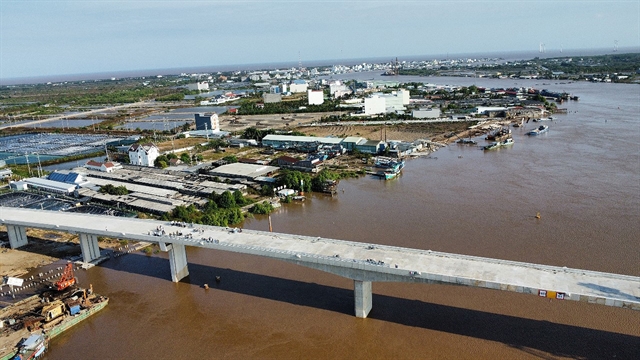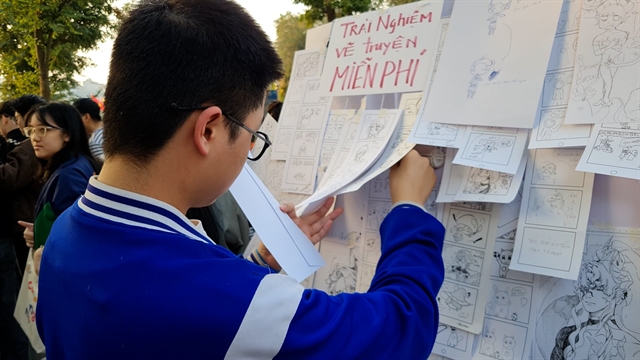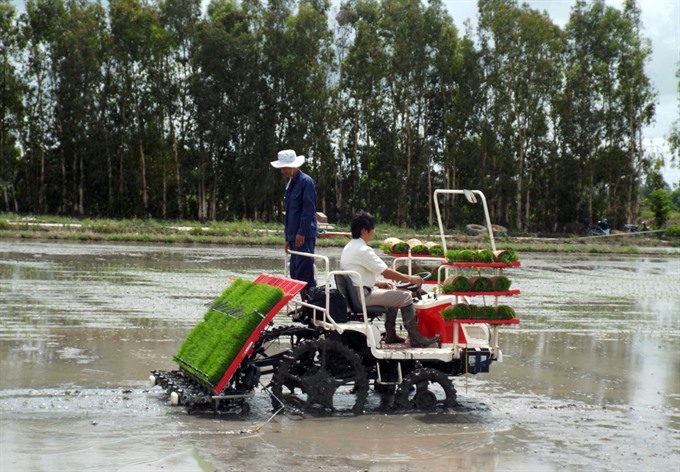 Society
Society

The implementation of a project called Co-operation to Develop Long Xuyên Quadrilateral Sustainably involving several provinces in the Mekong Delta will help exploit the region’s advantages, according to experts.
 |
| A rice planting machine being used in an unidentified place in the Mekong Delta. Source baoangiang.com.vn |
HCM CITY — The implementation of a project called Co-operation to Develop Long Xuyên Quadrilateral Sustainably involving several provinces in the Mekong Delta will help exploit the region’s advantages, according to experts.
Lâm Quang Thi, vice chairman of the An Giang Province People’s Committee and deputy head of the project’s standing board, told Người Lao Động (The Labourer) newspaper that the project has been submitted to the Government for approval.
After getting approval, the board would make detailed plans for the project, he said.
The quadrilateral comprises the provinces of An Giang, Kiên Giang, and Hậu Giang and Cần Thơ city covers an area of nearly 498,141 hectares.
The region is relatively low and flat. During the annual flood season from July to December it is flooded to a depth of 0.5-2.5 metres. In the dry season it is affected by drought.
The project seeks to link the three provinces and Cần Thơ with each other through the development of infrastructure and to use, protect and manage their water resources.
They will jointly make plans for production, investment, tourism, and commercial promotion.
They also will work with each other to build brands for their agricultural products.
Their authorities will recommend general policies for agricultural restructure to complement existing plans to improve livelihoods through adapting to climate change in the delta.
According to Thi, rice products and technologies for rice production will continue to be the region’s mainstay.
Seafood also has potential for development, he said.
Nguyễn Hữu Thiện, an independent expert on Mekong Delta ecology and a consultant to the project, said unlike previous projects, which focused on just the economy, this one would also focus on the community and environment.
It would provide an orientation for economic development for the next 20 years that would ensure the environment is not polluted, rivers are clean and there is social equality, he said.
People living in the region would no longer leave for other provinces or HCM City to work, he said.
The co-operation would help solve problems that each locality could not deal with individually, and build a common brand in the domestic and global markets, he said.
Dr Nguyễn Trọng Uyên, head of the Ministry of Agriculture and Rural Development’s agricultural design and planning division, said farmers continue to grow three rice crops a year without heeding scientists and experts’warnings, and the consequence is to change the flow of rivers and canals, affecting irrigation.
The quadrilateral does not yet have a main rice variety appropriate for the local ecology, he said.
Its production, processing and consumption of farm produce face difficulties because of the low number of co-operatives, farms and enterprises, Uyên said.
Solutions need to be found for these problems soon, he said.
But any plans made for the quadrilateral’s main agricultural products should dovetail with the overall plans for the delta, he warned.
Scientists should continue to assist farmers in the use of quality rice varieties, he said.
The irrigation, traffic and electricity systems should be developed together with the large-scale crop-growing areas, he said.
Ways to store more water in canals and other water bodies need to be found, Uyên added. —VNS